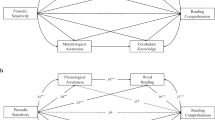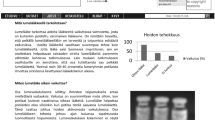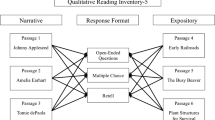Abstract
Results from traditional selective attention research suggest the selective attention strategy is not an adequate general explanation for why readers tend to learn and recall important text information better than less important text information. Selected research is reviewed in which conceptual, analytical, and methodological problems with this traditional research are discussed. Results from recent research are reported that support the notion that any understanding of how the selective attention strategy works must take into account differences in readers' metacognitive ability and differences in the complexity of the iteration of the strategy that they employ. The discussion centers on the development of a modified (in terms of measures of attention) and fluid version of the selective attention strategy that seems to succeed as a general explanation for the “importance” effect.
Similar content being viewed by others
References
Anderson, R. C. (1982). Allocation of attention during reading. In Flammer, A., and Kintsch, W. (Eds.),Discourse processing, North Holland Publishing Company, New York, pp. 292–305
Anderson, R. C., and Pichert, J. W. (1978). Recall of previously unrecallable information following a shift in perspective.J. Verb. Learn. Verb. Behav. 17: 1–12.
Anderson, R. C., Reynolds, R. E., Schallert, D. L., and Goetz, E. T. (1977). Frameworks for comprehending discourse.Am. Educat. Res. J. 14: 367–382.
Anderson, R. C., Shirey, L. L., Wilson, P. T., and Fielding, L. G. (1984).Interestingness of Children's Reading Material (Technical Report No. 323). University of Illinois, Center for the Study of Reading, Urbana-Champaign, Illinois.
Asher, S. (1980). Topic interest and children's reading comprehension. In Spiro, R. J., Bruce, B. C., and Brewer, W. F. (Eds.),Theoretical Issues in Reading Comprehension, Earlbaum, Hillsdale, New Jersey.
Britton, B. K., Piha, A., Davis, J., and Wehausen, E. (1978). Reading and cognitive capacity usage: Adjunct question effects.Mem. Cognit. 6: 266–273.
Britton, B. K., Meyer, B. J. F., Simpson, R., Holdredge, T. S., and Curry, C. (1979). Effects of the organization of text memory: Tests of two implications of the selective attention hypothesis.J. Exp. Psychol. Human Learn. Mem. 5: 496–506.
Britton, B. K., Meyer, B. J. F., Hodge, M. H., and Glynn, S. M. (1980a). Effects of the organization of text on memory: Tests of retrieval and response criterion hypotheses.J. Exp. Psychol. 6: 620–629.
Britton B. K., Ziegler, R., and Westbrook, R. D. (1980b). Use of cognitive capacity in reading easy and difficult text: Two tests of an allocation of attention hypothesis.J. Read. Behav. 12: 23–30.
Carroll, M., and Kirshner, K. (1982). Context and repetition effects in lexical decision and recognition memory.J. Verb. Learn. Verb. Behav. 21: 55–69.
Cirilo, R. K., and Foss, D. J. (1980). Text structure and reading time for sentences.J. Verb. Learn. Verb. Behav. 19: 96–109.
Driver, R., Guesne, E., and Tiberghiem, A. (eds.) (1985).Children's Ideas in Science, Open University Press, Philadelphia, Pennslyvannia.
Franks, J. J., Plybon, C. J., and Auble, P. M. (1982). Units of episodic memory in perceptual recognition.Mem. Cognit. 10: 62–68.
Frase, L. T. (1970). Boundary conditions for mathemagenic behaviors.Rev. Educat. Res. 40: 337–347.
Garner, R, Gillingham, M. G., and White, J. (1989). Effects of seductive details on macroprocessing and microprocessing in adults and children.Cognit. Instruct. 6: 41–57.
Goetz, E. T., Schallert, D. L., Reynolds, R. E., and Radin, D. I. (1983). Reading in perspective: What real cops and pretend burglars look for in a story.J. Educat. Psychol. 75: 500–510.
Gottman, J. M. (1981).Time Series Analysis, Cambridge University Press, Cambridge, Massachusetts.
Hidi, S., Baird, W., and Hilyard, A. (1982). That's important but is it interesting: Two factors in text processing, In Flammer, A., and Kintsch, W. (Eds.),Discourse Processing, North Holland, New York, pp. 63–75.
Jacoby, L. L. (1983a). Perceptual enhancement: Persistent effects of an experience.J. Exp. Psychol.: Learn., Mem., Cognit., 9: 21–38.
Jacoby, L. L. (1983b). Remembering the data: Analyzing interactive processes in reading.J. Verb. Learn. Verb. Behav. 22: 485–508.
Jacoby, L. L., and Dallas, M. (1981). On the relationship between autobiographical memory and perceptual learning.J. Exp. Psychol.: Gen. 3: 306–340.
Kahneman, D. (1973).Attention and Effort, Prentice-Hall, Englewood Cliffs, New Jersey.
Kintsch, W. (1974).The Representation of Meaning in Memory, Wiley and Sons, New York.
Kintsch, W., and Keenan, J. (1973). Reading rate and retention as a function of the number of propositions in the base structure of sentences,Cognit. Psychol. 5: 257–274.
Kintsch, W., and van Dijk, T. A. (1978). Toward a model of text comprehension and production,Psychol. Rev. 85: 363–394.
Lapan, R., and Reynolds, R. E. (1992).The Selective Attention Strategy as a Time-Dependent Phenomenon. Manuscript submitted for publication.
Mandler, J. G. (1980). Recognizing: The judgement of previous occurrence.Psychol. Rev. 85: 252–271.
Ortony, A., Reynolds, R. E., and Arter, J. L. (1978a). Metaphor: Theoretical and empirical research.Psychol. Bull. 85(5): 919–943.
Ortony, A., Schallert, D. L., Reynolds, R. E., and Antos, S. J. (1978b). Interpreting metaphors and idioms: Some effects of context on comprehension.J. Verb. Learn. Verb. Behav. 17: 465–477.
Pichert, J. W., and Anderson, R. C. (1977). Taking different perspectives on a story.J. Educat. Psychol. 69: 309–315.
Posner, M. L., and Boies, S. J. (1971). Components of attention.Psychol. Rev. 78: 391–408.
Reif, F. (1987). Instructional design, cognition, and technology: Applications to the teaching of scientific concepts.J. Res. Sci. Teach. 24: 309–324.
Reynolds, R. E. (1979).The Effect of Attention on Learning and Recall of Important Text Elements. Unpublished doctoral dissertation, University of Illinois, Champaign.
Reynolds, R. E. (1980, April).Cognitive Capacity Usage in Prose Learning. Paper presented at the meeting of the American Educational Research Association, Boston, Massachusetts.
Reynolds, R. E. (1992).Metaphors in Text: Implications for Theories of Prose Learning. Manuscript submitted for publication.
Reynolds, R. E., and Anderson, R. C. (1982). Influence of questions on the allocation of attention during reading.J. Educat. Psychol. 74: 623–632.
Reynolds, R. E., and Bliss, S. (1992).Selective Attention and Objectives: A Study of Sixth-Grade Readers. Manuscript submitted for publication.
Reynolds, R. E., and Schwartz, R. M. (1983). The relation of metaphoric processing to comprehension and memory.J. Educat. Psychol., 75(3): 450–459.
Reynolds, R. E., and Shirey, L. L. (1988). The role of attention in studying and learning. In Goetz, E. T., Weinstein, C. E., and Alexander, P. (Eds.),Learning and Study Strategies: Issues in Assessment, Instruction and Evaluation, Academic Press, Washington, D.C., pp. 77–100.
Reynolds, R. E., and Wade, S. E. (1986). Thinking about thinking about thinking: Reflections on metacognition.Harvard Educat. Rev. 56: 307–317.
Reynolds, R. E., Standiford, S. N., and Anderson, R. C. (1979). Distribution of reading time when questions are asked about a restricted category of text information.J. Educat. Psychol. 71: 183–190.
Reynolds, R. E., Taylor, M. A., Steffensen, M. S., Shirey, L. L., and Anderson, R. C. (1982). Cultural schemata and reading comprehension.Read. Res. Quart. 17: 353–366.
Reynolds, R. E., Goetz, E. T., and Kreek, C. (1984, April).Metafocusing: The Role of Metacognitive Awareness in the Focusing of Attention. Paper presented at the meeting of the American Educational Research Association, New Orleans, Louisiana.
Reynolds, R. E., Wade, S. E., Trathen, W., and Lapan, R. (1989). The selective Attention strategy and prose learning. In C. McCormack, G. Miller, and M. Pressley (Eds.),Cognitive Strategy Research: From Basic Research to Educational Applications, Springer-Verlag, pp. 159–190.
Reynolds, R. E., Shepard, C., Lapan, R., Kreek, C., and Goetz, E. T. (1990). Differences in the use of selective attention by more successful and less successful tenth-grade readers,J. Educat. Psychol. 82(4): 749–759.
Reynolds, R. E., Brown, K., Trathen, W., and Niederhauser, D. (1992a).Successful and Less Successful Readers' Commitment to a Strategy. Manuscript submitted for publication.
Reynolds, R. E., Niederhauser, D., Gardner, M., and Hill, C. (1992b).The Influence on Prose Comprehension of Including Metaphors in Text: A Processing Approach. Manuscript to be submitted for publication.
Reynolds, R. E., Schraw, G., and Trathen, W. (1992c).Metaphors and Idioms: Differences in Attention and Strategy. Manuscript submitted for publication.
Reynolds, R. E., Trathen, W., Sawyer, M., and Shepard, C. R. (1992d).Causal and Epiphenomenal use of the Selective Attentive Strategy in Prose Comprehension. Manuscript submitted for publication.
Reynolds, R. E., Wade, S. E., and Sorensen, M. (1992e).Straight Words/Crooked Meanings: Understanding Metaphors. Manuscript submitted for publication.
Reynolds, R. E., Wade, S. E., Trathen, W., and Lapan, R. (1992f).Components of Effective Strategy Use in Prose Learning Situations: Adaptability, Efficiency, and Sophistication. Manuscript submitted for publication.
Rothkopf, E. Z. (1966). Learning of written instructive materials: An exploration of the control of inspection behavior by test-like events.Am. Educat. Res. J. 3: 241–249.
Rothkopf, E. Z., and Billington, M. J. (1979). Goal-guided learning from text: Inferring a descriptive processing model from inspection times and eye movements.J. Educat. Psychol. 71: 310–327.
Rumelhart, D. (1976).Toward an Interactive Model of Reading (Tech Rep. No. 56), University of California, Center for Human Information Processing, San Diego.
Schneider, W. (1985). Developmental trends in the metamemory-memory behavior relationship: An integrative review. In Forest-Pressley, D. L., MacKinnon, G. E., and Waller, T. G. (Eds.),Metacognition, Cognition, and Human Performance: Vol. 1 Theoretical Perspectives, Academic Press, Orlando, Florida, pp. 57–109.
Shepard, C. R. (1989). Conceptual and Perceptual Text Processing Strategies: Differences between Good and Poor Readers. Unpublished Masters thesis, University of Utah, Salt lake City.
Shirey, L. L., and Reynolds, R. E. (1988). The effect of interest on attention and learning.J. Educat. Psychol. 80(No. 2): 159–166.
Stanovich, K. E. (1980). Toward and interactive-compensatory model of individual differences in the development of reading fluency.Read. Res. Quart. 16: 32–71.
van Dijk, T. E., and Kintsch, W. (1983).Strategies of Discourse Comprehension, Academic Press, New York.
Wade, S. E., Schraw, G., Buxton, W. M., and Hayes, M. T. (1991).Seduction of the Strategic Reader: Effects of Interest on Strategies and Recall. Paper presented at the annual meeting of the American Educational Research Association, Chicago.
Webster's Ninth New Collegiate Dictionary (1988). Merriam-Webster, Springfield, Massachusetts.
Author information
Authors and Affiliations
Rights and permissions
About this article
Cite this article
Reynolds, R.E. Selective attention and prose learning: Theoretical and empirical research. Educ Psychol Rev 4, 345–391 (1992). https://doi.org/10.1007/BF01332144
Issue Date:
DOI: https://doi.org/10.1007/BF01332144




